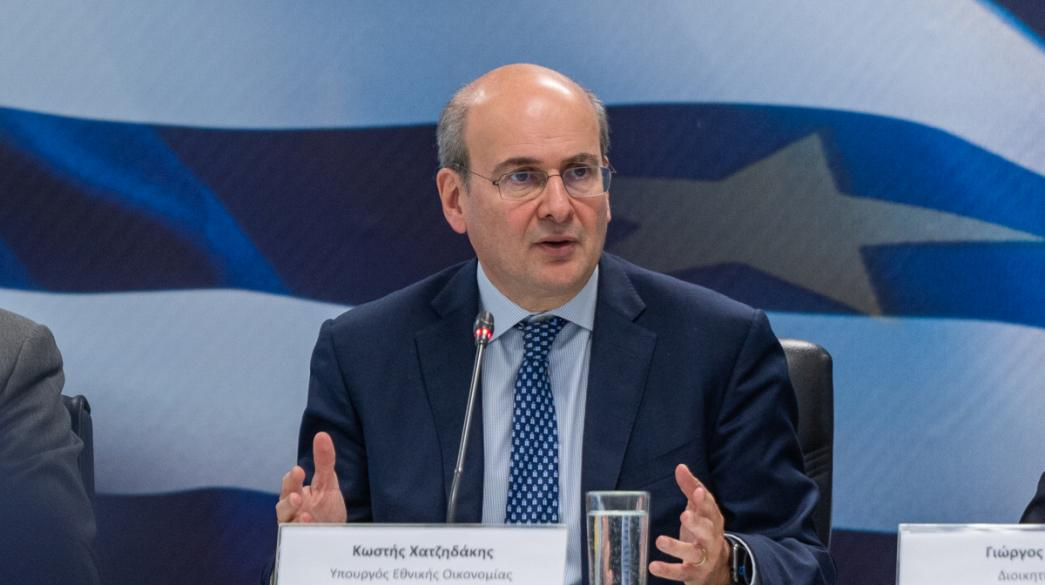
In the presence of the Minister of National Economy and Finance, Mr. Kostis Hatzidakis, and on the subject of developments in the Greek economy and the priorities of economic policy for the next period, the meeting of the Board of Directors of the Hellenic Chamber of Commerce and Industry was held on Monday, 14 October.
After welcoming Mr. Hatzidakis, the President of the Chamber of Commerce and Industry, Mrs. Sofia Kounenaki Efraimoglou, referred to the economic developments, stressing that the draft Budget for 2025 confirms the good performance of the Greek economy in 2024 and the positive prospects for next year.
STATEMENTS
"The business world recognizes every positive step in the field of economic policy. And this recognition does not remain in words, but all this time, it has translated into new business initiatives, new jobs, and increased tax revenues. In this context, and always in line with the course of achieving the fiscal targets," said the President of the Chamber of Commerce and Industry, "we expect that in the coming period, we expect to continue the interventions to reduce taxes for businesses and individuals.". In addition, Ms. Efraimoglou proposed the creation of a permanent mechanism to support businesses against the sharp fluctuations in energy costs, "as this is a critical issue that will continue to be of concern as the conflicts in the Middle East escalate."
Furthermore, the President of the Chamber of Commerce and Industry referred to the need to adhere to a fiscal policy that is both responsible and growth-friendly, which creates fiscal space through the broadening of the tax base, the more effective fight against tax evasion, and the radical rationalisation of government spending. Particularly on the issues of tax transparency and the digitisation of the tax administration, Ms. Efraimoglou said significant steps forward have been made, but more can be done, with an emphasis on better targeting of tax audits. "It is important that tax authorities gradually acquire appropriate technological tools and methodology to effectively control tax evasion and reduce the need for horizontal interventions. We believe that tax evasion and the underground economy are long-standing problems for the Greek economy. They are, at the same time, the harshest forms of unfair competition against prudent businesses and professionals," said the President of the Chamber of Commerce and Industry.
Ms. Efraimoglou also stressed that the critical issue for increasing public revenues is the achievement of rapid and, at the same time, sustainable growth, which creates national wealth and supports the rise in incomes and the effective functioning of the welfare state. In order to maintain the high growth rate in the coming years, the President said it is important to accelerate the rate of absorption of Recovery and Resilience Fund resources to the private sector, with a focus on long-term investments in high productivity and value-added sectors. In addition, access to sources and instruments of finance for SMEs needs to be enhanced, not only with useful programs such as TEPIX III but also by broadening financing options through the use of institutions such as microcredit and by creating an ecosystem of smaller banks that will boost market supply. In the same vein, the President said, policies to increase national savings with targeted incentives need to be considered.
"Both the economy and businesses have shown remarkable resilience in recent years. This is something few would have expected, given the crises we have experienced over the past decade. Yet none of us can afford to be complacent. The road ahead is still long. And we have to walk it, amidst international instability and uncertainty. Continuity, consistency, and perseverance are needed at all levels. We, as a Chamber, will continue to be here to submit our proposals responsibly and to support every positive initiative," the President of the Chamber of Commerce and Industry concluded her speech.
For his part, the Minister of National Economy and Finance, Mr. Kostis Hatzidakis, said: "The Greek economy is expected—despite the unfavourable and uncertain international environment—to continue to outperform in the coming years. For 2025, the draft budget forecasts a growth rate of 2.3% compared to 1.4% estimated for the Eurozone. At the same time, the new Medium-Term Fiscal-Structural Programme 2025-2028 foresees a very significant reduction in public debt to 133.4% of GDP in 2028, thanks to higher-than-European-average growth rates that will bring the country's GDP to €272 billion in the same year. We will have similar positive developments in the unemployment area.






